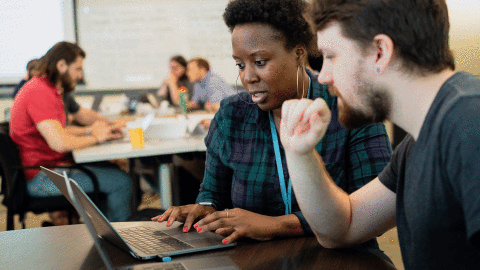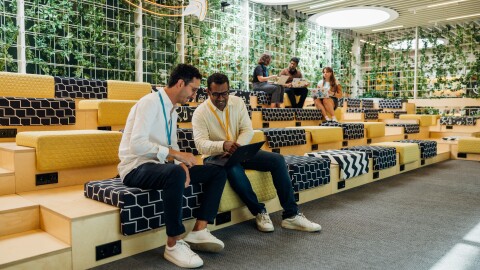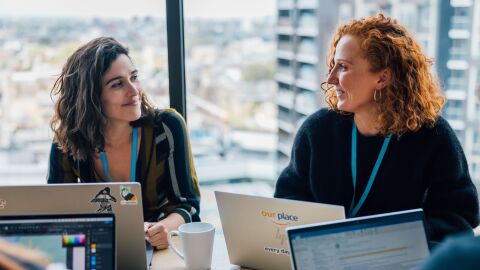Two Amazonians - Kathryn Xistris, Senior Practice Manager and Head of Amazon Web Services (AWS) World Wide Public Sector Professional Services for Europe, Middle East, and Africa (EMEA), and Beyza Özkan Özbilgin, AWS Account Manager, Turkey - recently led discussion sessions at ‘We Power Tech’ events in Bahrain and Turkey. They invited female IT leaders, who are also AWS customers, to talk about a variety of subjects, including pushing boundaries in cloud technologies, and building diverse, and inclusive, teams. You can read what they had to say in this article in Gulf News.
We got Kathryn and Beyza’s advice on what preparation, and skills, are involved in pulling off the perfect panel.
How did you prepare personally to host your panel?
Kathryn: About three weeks before the event, our communications manager briefed me on the panelists, the topics, and desired outcomes, for the session. We brainstormed a rough flow for the discussion. Two weeks before, I researched the panelists’ backgrounds, read up on their organizations, and prepared a first draft of questions. We had invited four women leading digital transformation with AWS in large enterprises in the Middle East, including the Chief Technology Officer for Aramex, a leading logistics company, and the Chief of IT at the Ministry of Information and Authority in Bahrain. They came to share their experience of driving cloud adoption and transformation within their industries, including travel, education, and transportation. It was critical that I had a clear understanding of their various backgrounds so that I could do justice to their achievements, and ensure they had the opportunity to highlight them. One week before the event, I shared my suggested talking-points with the panelists, and incorporated their feedback. I followed up with a call to each panelist and agreed on the first question I was going to ask them. Some panelists can be nervous. I knew from previous panels that getting them ready for the very first question can help to ease them into the discussion on the day.
Beyza: After deciding on the topics of the panel with my team I selected and confirmed the panelists. It’s so important to invite panelists with strong knowledge of a topic - in this case, Digital Transformation - and make sure there’s a diversity of opinion and perspectives. So we welcomed guests including the Chief Data Officer at Coca-Cola Company and the Founding President of WTech, a Turkish association for women in technology. I then did research to elicit the most interesting conversational points, and show the value of the panelists’ expertise. I didn’t want to be surprised by anything I heard during the panel so I read a lot of articles, and reviewed the panelists’ published pieces. From this I created a format and prepared much more than I was going to ask, so that I had ‘Plan B’ questions.
What were some of the most interesting aspects of the discussion?
Kathryn: The whole event was very rewarding for me. With 35 years of experience in IT this was the first time I was on stage with an all-female panel. It felt great to showcase their talents and leadership. A couple of points stood out. One of our guests was from the travel and tourism company Seera Group. Her title was VP of Data, underscoring the importance of data to organizations in 2019. This is a real business shift. We uncovered how Aramex is using artificial intelligence and machine learning to transform the last mile of delivery, which is revolutionizing their business model. We also heard how a new university launched their entire IT infrastructure in just 9 days. This was unheard-of at the beginning of my career. It really demonstrated the power of the AWS cloud.
Beyza: One of the panelists was talking about diversity in the technology sector. She said that if only men are involved in the projects it’s like working with half a brain. The more women we can include, the more we can work with a full brain. I liked that description a lot.
How did you to help the panelists get their stories across?
Kathryn: I created an environment for them to feel comfortable sharing their stories. And they helped each other by building on each other’s points. As chair of the panel, you have to listen actively, and make sure your questions are tailored to what they’ve just said. You need to lead them towards the areas you’d like to move on to next, to give them a chance to showcase their achievements, and experiences.
Beyza: The day before the panel we all had a rehearsal lunch. This helped us to get to know each other’s backgrounds, and gave our conversation a natural flow. They knew what questions were coming so that they could prepare, and come in with valuable insight.
Were you nervous about speaking in front of a large audience?
Kathryn: I’m always nervous when I speak publicly, and this is a good thing! It means that you bring your A game. I write out a full script and get very comfortable with it by reading it over and over again out loud. Then on the day, I just use key words on cue cards as memory aids.
Beyza: Not being nervous is about good preparation and practice. I read and listen to widen my perspective. I practise my speech. I type out the full first draft and read it again, and again. At some point it just starts to flow. The rehearsal lunch helped us to get to know each other, so it was a more natural conversation when we were on stage.
What are your tips for other people hosting a panel discussion?
Kathryn: Make sure you build your content with the panelists and make it customer centric – meaning, make sure it brings insights that make the audience feel good about the time they’ve invested in coming along. Get the panelists to work together, and you will see a natural flow of topics. You can share one personal story that relates to the topic in order to build rapport with the audience; but otherwise slip into the background and let the panelists light up the stage.
Beyza: There should be a clear message. The moderator should know the audience and the panelists very well. Practice is very important. Say the questions out loud, imagine it’s a theatre. If you’re prepared, you’ll be comfortable in front of your audience, which means your panel should feel comfortable too.
Why is taking part in events like this important to you personally, and for women in tech more broadly?
Kathryn: It is so important to give a voice to these exceptional women, and give them a chance to showcase their trailblazing achievements to a broader audience. Personally it was great to learn from each other and create a bond. It was energizing!
Beyza: I found it was a powerful way to share my ideas and become recognized in my field. It’s important to create awareness with these kinds of events. We can share our challenges with the rest of the community, and maybe we can prevent them from having the same problems. We can hear success stories and encourage those women. Especially the younger generation.
What did you learn for next time?
Kathryn: When we all got together there was so much energy. I would like to have harnessed it further. I’m thinking of ways to keep this group together and add other strong talented female leaders to it for future events.
Beyza: I would involve the audience in the panel a little more, even just for three or four minutes. I think it would enhance the event.











